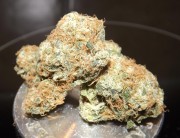By Dr. L.Tennant
Inflammatory Bowel Disease (IBD) is a term used to describe chronic, immune mediated conditions affecting the gastrointestinal tract, primarily ulcerative colitis and Crohn´s disease. The diseases are characterized by abdominal pain and cramping, fever and fatigue, diarrhoea, bloody stools, reduced appetite and weight loss. IBD is becoming a major health issue in Canada, with 1 in 150 citizens affected. The cause of the diseases remains unclear, with most research suggesting immune dysregulation to be responsible, aggravated by stress and diet.
Treatments options at present are focused on reduction of inflammation using anti-inflammatory and immune suppressant drugs, symptomatic relief for pain and diarrhoea, nutritional supplements and in severe cases, surgery. However, there is no single therapy and each treatment must be carefully tailored to the individual patient.
Clinical and scientific evidence supports the use of medicinal cannabis for symptomatic relief for patients with IBD. In fact, the use of cannabis plant extracts for the treatment of gastrointestinal ailments dates back to ancient times and recent advances in medicine are shedding light on the underlying molecular mechanisms behind the alleviating effects observed in patients.
Cannabinoid compounds act as neuromodulators of the endocannabinod system (ECS) where they regulate tissue homeostasis and cognitive and neurological processes including pain sensation, appetite and motor learning via the cannabinoid receptors, CB1 and CB2. The digestive tract expresses both CB1 and CB2 receptors widely as well as the endogenous ligands for both, where they participate in the regulation of gastrointestinal motility and the repair and maintenance of the epithelial tissue barrier.
In IBD patients, increased expression of types of CB1 and CB2 receptors has been reported and a number of human and animal studies have shown that experimentally increasing cannabinoid compound levels in diseased tissues (OEA, PEA and D9-THC) resulted in reduced inflammation, epithelial damage and colitis in experimental colitis models. The reduction of inflammation is thought to be mediated through recruitment of immune cells to the site of inflammation and inhibition of the release of key inflammatory cytokines (TNF-α, IFN and Interleukins). Supporting data from several clinical studies of IBD patients shows that medication with cannabis was beneficial to alleviate symptoms of diarrhoea, abdominal pain and appetite loss. Overall, the evidence points to medicinal cannabis containing a number of ingredients that can help IBD patients tackle the underlying inflammation as well as the associated symptoms by manipulating the endocannabinoid system.
Two D.S. & FITZ strains are considered highly effective for treating IBD symptoms due to their high THC content and ability to act as effective pain relief agents. These include Truffles & Cheese (21%-25% THC), Platinum Mint Cookies (17%-20% THC) and Hustle & Grind (19.3% THC).
To become a D.S. & FITZ client, click here
















